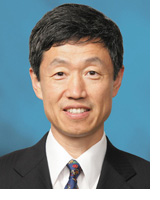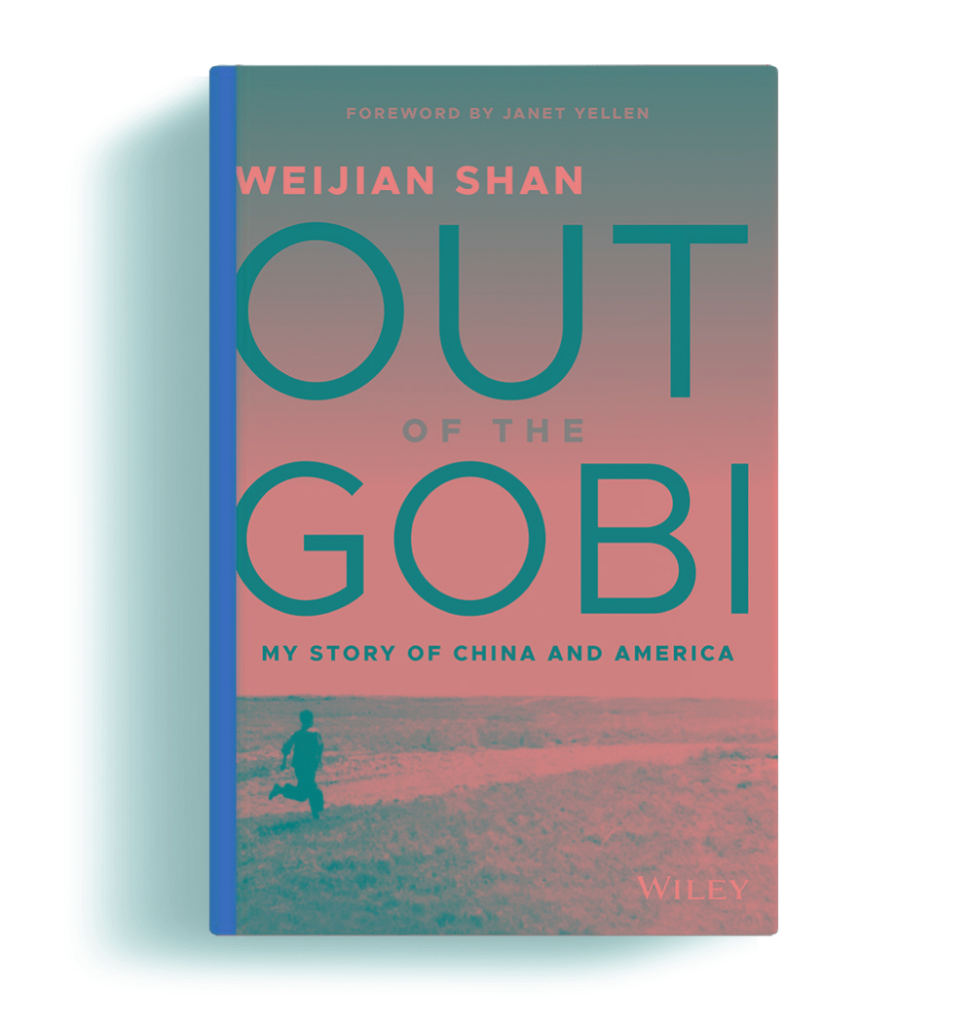Dr. Weijian Shan- Chinese Crusader with a Dream to Catchable
By Blair Zhou, Wall Street Media
Weijian Shan’s memoir “Out of the Gobi” has taken the United States by storm. Highly praised by both major media like the New York Times, Wall Street Journal, and USA Today, and general readers alike, Dr. Shan’s autobiorgraphicalsaga of his life as an exile in the Gobi Desert and subsequent rise to become one of the most successful financiers in China has been called “the book that will change your view on China.”
After an intensive round of media interviews and book talks in London and then New York, Dr. Shan ended his whirlwind tour with a crowded event sponsored by the highly regarded National Committee on US-China Relations. The event at the CBS Television headquarters in mid-town Manhattan was co-hosted by Dorsey & Whitney, a prestigious global law firm. Dr. Shan was introduced by Stephen Orlins, the National Committee’s president and a close friend of the author’s. Mr. Orlins. who is also managing director of Carlyle Asia,described Shan’s book as “a history of the last 60 years of China, personalized.”
Shan began his talk commenting on the very unexpected, but overwhelming response his book has created,in the U.S., topping Amazon’s best seller list for four consecutive weeks and continuing as one of the biggest selling books of the past year. Dr.Shan, Chairman and CEO of PAG, one of Asia’s largest independent alternative investment management groups, then kept his audience rapt with attention for more than another hour and a half, recounting the horrific experiences he endured during his six years of hard labor in the Gobi desert as a member of Mao’s infamous Red Guard, 16 million teenagers who were sent to the provinces to be ‘re-educated by peasants”. The trauma inflicted on Shan and his contemporaries was often unspeakable. Their education was cut short and their lives disrupted, if not destroyed. Most were consigned to poverty and menial jobs ever after the Cultural Revolution had ended. Shan works on a state farm in the Gobi, where he dug ditches, harvested potatoes, practiced medicine as a barefoot doctor with no training whatsoever, and made bricks out of ox dung, taking his audience through a world remarkably suggestive of the harsh conditions Charles Dickens described in his classic novel, Great Expectations. Like a Dickens character, Weijian Shan’s suffering proved only to make him stronger. With his natural ability as a storyteller, Shan spoke with the clarity of the world renownedinvestment banker he has become, articulating his every word with feeling, evoking powerful images through minute details. His delivery was that of a pleasant cross between passion and presentation and he kept his audience hanging on to his every word, engaged, awed, and overwhelmed.
Shan recounted much of his early life, when he was a young 12-year old city scamp living in old Beijing, running around with local gangs and getting into mischief, as the full impact of Chairman Mao’s Cultural Revolution began to unfold. Shan was at first an enthusiastic volunteer and longed to be part of this great cultural awakening. He was assigned to the Gobi Desert and with a few friends he relished the importance of his new job, planting rice in the frozen sands of the tundra where temperatures often dropped to 10 degrees below zero Farenheit night and the only available water was solid ice. For more than seven years, Shan was “stationed” in the Gobi, but he felt as though he had been banished. His family back in Beijing had been torn apart during the Cultural Revolution. His mother and sister were sent to two different provinces, although his aging father and much younger brother were allowed to remain in sadly reduced circumstances in Beijing. Shan himself, however, gained strength and innovation as an ill-fed, overworked Red Guard but was reduced to taking serious risks to find the only food available—chickens he and his confederates had to steal from local peasants to keep from starving to death. He recounted thinking on one such outing that if he were to drop dead right there and then, it was more than likely no one would ever find his body and he would have been turned into aspeck of dust and become part of the sand under his feet. It was there, in that barren and desolate landscape in the middle of nowhere, that Shan was fortunate enough to meet a pilot from the China Aviation Service who had been exiled to the Gobi and told to raise pigs. Meeting this older individual, who had flown around the world, became Shan’s close friend and mentor and provided a camera that Shan used to record conditions in the Gobi, but also planted the seeds of Shan’s dream of someday going abroad. Upon Mao’s death, Shan was able to learn English and become one of the first Chinese ever to come to America where he would receive a formal education (despite the fact that he had, essentially, no secondary education and had taught himself mathematics while in the Gobi.Coming to America had abruptly changed the course of Shan’s life and providedhim with a stunning Hollywood persona: a Chinese crusader out of Gobi, chasinghis dream and determined to make that dream come true, at any cost!
Over the next forty years, Shan never dared to stop, or even slow down. Enrolled at UC Berkeley, he obtained both his Master of Arts and also, amazingly, his Doctor of Philosophy degrees and then in the 1980’s, became a mathematics professor at the famous Wharton School where President Donald Trump learned finance. The economic boom of the 1990s offered Shan the opportunity to become a legendary financier in the making. He was recruited by the legendary David Bonderman’s Texas Pacific Group (TPG) where Shan helped make billions of dollars for TPG’s clients. His finance career then took him to first to Asia andeventually back to China, this time not to plant rice, but to harvest gold. Shanbecame one of the first private equity investors in China, the first to buy a state-owned bank (which is now worth US$60billion) and one of the first to acquire other SOEs which strengthened his relationships with Beijing and made Shan and his investors immense returns.
Among the crowd present at this last event for Shan in the United States were many members of the media, artists who were interested in the theme of China and Gobi, fellow Chinese writers, and many young American and Chinese investment bankers who dream of become the next Weijiang Shan one day soon.
Just for the record, however, Shan ended his talk with a brief overview ofmarket trends in China’s historic economic revolution. Just 50 years ago, he pointed out, the average yearly salary in China was less than $150. Shan himself made $10 a year during his time in Gobi. Because of this, China’s GDP had been based primarily on export, but no one in China could afford to buy the goods they were making for mainly western markets. Even just 10 years ago, 70% of China’s GDP was from export, while only 30% was generated by domestic consumption. By 2018, however, these statistics have seen a radical reverse, with more than50% of China’s GDP now coming from domestic consumption while export accounts for only 19%. Over the past three decades, China has been gradually shifting to a more liberal market with private sectors today accounting for more than 60% of China’s GDP. Shan believes this trajectory isn’t changing and thatChina’s future lies in a market economy, similar to most western countries.
Shan ended his talk by recounting the significant and very different life coming to the U.S. and then returning to China has given him. His life today could not be more removed from the lives his old friends he lived and worked with in the Gobi. His entire generation, Shan says, is a lost generation, youths forced into the countryside to grow crops in impossible conditions and robbed not only of any education, but in so many cases, of any hope of ever improving their lot in life. His friends who did not have the opportunity of leaving China today live in poverty and are unable to find work or earn a living and have become wards of the state.. Ashe spoke these words, however, Shan’s tone softened, not of a world renownedinvestment banker, but an individual who has no fake sympathy, no judgement,just the matter of fact recounting of his own miraculous good fortune.
For Shan, the Cultural Revolution was an example of what happens when agovernment has absolute control. It is a time of chaos where everyone, from peasants to the highest government officials, can suffer and an entire generation can not only become “lost”, but can also turn against one another. To survive such a period can and was a daily struggle. For Shan, the Cultural Revolution serves as a cautionary tale against government owning everything and mandating all aspects of a person’s life, including who should live and who should die.
When asked Shan if he had a specific group of people, a target audience, he wanted his book’s message to reach? His response suggests his book is not just a vanity project written for his own benefit. Shan said he started writing this book when his children were young, that in his household, instead of telling his children fairytales, he would tell them about his time in the Gobi and his kids were more enthralled than they would ever be since this was the life their father had actually led. Shan began writing this book 27 years ago but it wasn’t until 2017 that he decided to make finishing this book his New Year’s resolution. He wrote this book, Shan says, for his children, and other children of the “lost generation” to know of this most horrific period in Chinese history and appreciate what they have, and even more importantly, appreciate the world they now live in. Shan has passed the torch of a dreamer on to the next generation of crusaders, whichincludes me, a millennium member whose parents shared Shan’s experience out of China to America and who, like Shan, have made their own lives anotherHollywood story.
单伟建:一个追梦者的美国之旅
作者 Blair Zhou 华尔街传媒
单伟健先生的回忆录《走出戈壁》风靡美国,受到《纽约时报》《华尔街日报》《今日美国》等主要媒体及广大读者的高度赞扬。单博士的传奇自传记录了他如何从流亡戈壁到成为中国最成功的金融家之一,本书被誉为“一本将改变你对中国看法的书”。
在伦敦和纽约举办了一轮紧锣密鼓的媒体采访和见面会后,单博士旋风般旅程的最后一场,在曼哈顿中城的CBS总部举行,由美中关系全国委员会和著名的全球律师事务所Dorsey&Whitney共同主办。美中关系全国委员会主席、同时也是单博士的好友,斯蒂芬·奥林斯(Stephen Orlins)先生向大家正式介绍了单博士,奥林斯先生本人也是凯雷亚洲区董事的总经理,他将单博士的新书描述为“一段中国过去60年的历史,私人订制”。
单先生说,他的书在美国引起了非常意想不到的反响,连续四周位列亚马逊的畅销书榜,并继续成为最畅销的书之一。单伟健先生也是亚洲最大的独立另类投资管理集团之一PAG的董事长兼首席执行官。随后,现场观众细心聆听了他超过一个半小时的演讲,讲述他作为毛泽东时代的红卫兵,在戈壁沙漠长达六年的艰苦劳动的经历。当时有1600万青少年被派往各省接受“贫下中农再教育”,单伟健及其同时代人所遭受的创伤往往难以形容。那时候,他们所受的教育被中断,他们的生活即便没有被彻底摧毁,也被完全扰乱。文化大革命结束后,他的同代人“老三届”,大多数都只能从事低薪和卑微的工作。单伟健在戈壁滩上的一个国营农场工作,在那里他挖沟、收获土豆、作为赤脚医生从事医学工作(尽管没有进行过任何培训),并用牛粪制作砖头。单先生在戈壁滩的经历与查尔斯·狄更斯的经典小说《远大前程》中提到的严酷生存条件相似,但也像狄更斯笔下的故事,艰难困苦只让书中的主人公变得更强大。单是一个天生擅长讲故事的人,娓娓道来,每一句话都充满感情,通过微小的细节唤起听众心中强烈的画面感。他的讲述是激情与表达之间的愉快交融,他让听众沉浸在他说的每一句话中,感同身受,内心充满敬畏和感动。
单伟健回忆起他早年的生活,当时他只是一个12岁的城市小混混,住在老北京城,随处乱窜,参与当地帮派的争斗和闹事,直到毛主席发动的文化大革命影响到了所有人。单伟健起初是一位热心的志愿者,渴望成为这种“伟大的文化觉醒”的一分子。他被分配到戈壁沙漠,和几个朋友一起认识到了新工作的重要性,在苔原的冰沙中种植水稻,温度经常降到零下10华氏度以下,唯一可供使用的水源是固体冰。在七年的时间里,单伟健“驻扎”在戈壁,也可以说被放逐了。他远在北京的家人在文化大革命期间被迫分开,尽管他年迈的父亲和弟弟被允许留在北京,他的母亲和妹妹被送往两个不同的省份。他本人作为一个常年吃不饱又过度劳累的红卫兵,沦落到不得不冒险从当地农民手中偷鸡以免饿死。他讲述了一次在戈壁中偷食时萌生的一个念头:如果此次就死在了这里,那么很可能没有人能找到他的尸体,他会变成一粒灰尘,成为脚下沙丘的一部分。也是就在那里,在一片荒芜的土地上,单伟健幸运地遇到了一位被流放到戈壁养猪的原中国航空局的飞行员。这位曾在世界各地飞行的老人,成为了他的亲密朋友和人生导师,并送给了他一台相机,用来拍摄记录戈壁的日子,这位长者也为单将来出国的梦想埋下了梦幻的种子。毛泽东去世后,中国开放,单伟健有幸能够离开戈壁,学习英语,成为第一批来美国求学的中国留学生,尽管他没有接受过中学教育,不得不在戈壁自学数学。美国改变了单伟健的人生进程,帮助他成为了一个令人惊叹的好莱坞式的传奇人物:一个从戈壁出来的中国骑士,不惜任何代价地去追逐和实现人生梦想!
在接下来的四十年里,单伟健从不敢停下奋斗的脚步或放慢速度。他就读于加州大学伯克利分校(UC Berkeley),不仅获得了文学硕士学位,还获得了哲学博士学位,然后在20世纪80年代成为了著名的沃顿商学院(Wharton School)的经济数理教授,特朗普总统(Donald Trump)曾在该校学习金融。20世纪90年代的经济繁荣,成就了单伟健从教授转变为传奇金融家的机会。他被华尔街了不起的人物大卫•邦德曼(David Bonderman)的德克萨斯太平洋集团(Texas Pacific Group,TPG)聘用,在那里,单先生帮助TPG的客户赚了数十亿美元。金融生涯让单伟建去到经济崛起的亚洲,最终回到中国,这次不是种植水稻,而是收获黄金。单成为中国第一批私人股本投资者之一,也是第一批收购国有银行(目前价值600亿美元)和其他国有企业的投资人。这些投资活动带来多方共赢。
出席此次单伟健博士美国活动的嘉宾当中,有许多媒体人、对中国和戈壁主题感兴趣的艺术家和作家,以及许多梦想着不久后能成为下一个单伟健的、来自中国和美国的年轻投资银行家们。
在演讲尾声,单伟健博士简要概述了中国历史性经济革命的市场趋势。他指出,50年前,中国的人均年收入还不到150美元。在戈壁期间,他自己每年只有10美元的收入。因此,当时中国的GDP主要以出口为主,中国人买不起出口西方市场的“外贸商品”。即便是10年前,中国GDP的70%仍旧来自出口,只有30%来自国内消费。然而,到2018年,这些统计数据发生了根本性的逆转,中国GDP的50%以上来自国内消费,出口仅占19%。在过去三十年中,中国已经逐渐转向更自由的市场,如今私营经济占中国GDP的60%以上。他认为,这一发展轨迹并未发生变化。与大多数西方国家类似,中国的未来在于市场经济。
演讲最后,单伟健提到了他来到美国后又返回中国所经历的非常不同的生活,这让他感触良多。他说,他今天的生活离不开一起在戈壁生活和工作的老朋友们。他们整整一代人都是迷路的一代,年轻人被迫去到农村,在不可能的条件下种植庄稼,他们不仅被剥夺了受教育的机会,在许多情况下,也被剥夺了任何改善生活的希望。那些没有机会离开中国的朋友们,有的生活贫困,找不到工作和谋生之路,只能领取低保。当他提到这些时,他的语气变得柔和,那一刻他不是一个世界知名的投资银行家,而是一个没有虚假同情心、不评判别人的平凡人,只是如实地讲述自己神奇又幸运的命运。
对单伟健来说,文化大革命是政府拥有绝对控制权的一个例子。那是一个混乱无序的时期,从农民到政府最高官员,每人都遭受一样的苦难,一整代人不仅迷失,而且人人自危。要在那样一个时期生存,每天都是艰难的斗争。对单先生来说,文化大革命是一个警示,警告政府不能拥有一切,不能主宰每一个国民生活的方方面面,包括谁应该活着,谁应该死去。
记者提问,单先生是否想把书中信息传达给一个特定的群体,一个目标受众?单回答说他的书不是为了个人利益而写的一个虚荣的项目。他说,在他的孩子们小的时候,他就开始写这本书。在家里,他不会给孩子们讲童话故事,而是讲述他在戈壁的经历,他的孩子为此更为着迷,因为这是父亲真正经历过的生活。单伟健27年前就开始写这本书,但直到2017年,他才决定把这本书作为2018年的新年愿望完成并出版。他说,他写这本书,是为了让他的孩子们和其他“迷失的一代”的孩子们,了解中国历史上最可怕的一段时期,从而更珍惜他们拥有的一切,珍惜他们今天生活的世界。
单伟健博士是一位梦想家,也许《走出戈壁》,就是他的一个梦想传递——把他的梦想传递给下一代的追梦者们,其中包括我,一个千禧一代的青年。我的父母80年代走出中国来到美国求学求生的故事,和单伟健先生的故事一样激动人心,他们的人生过往,编织成中美美好时期的好莱坞故事,激励我们下一辈走好父母开拓的路!
完



